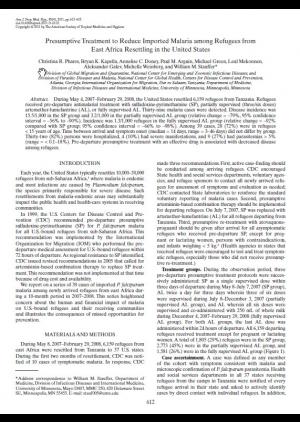Abstract: During May 4, 2007–February 29, 2008, the United States resettled 6,159 refugees from Tanzania. Refugees received pre-departure antimalarial treatment with sulfadoxine-pyrimethamine (SP), partially supervised (three/six doses) artemether-lumefantrine (AL), or fully supervised AL. Thirty-nine malaria cases were detected. Disease incidence was 15.5/1,000 in the SP group and 3.2/1,000 in the partially supervised AL group (relative change = –79%, 95% confidence interval = –56% to –90%). Incidence was 1.3/1,000 refugees in the fully supervised AL group (relative change = –92% compared with SP group; 95% confidence interval = –66% to –98%). Among 39 cases, 28 (72%) were in refugees < 15 years of age. Time between arrival and symptom onset (median = 14 days, range = 3–46 days) did not differ by group. Thirty-two (82%) persons were hospitalized, 4 (10%) had severe manifestations, and 9 (27%) had parasitemias > 5% (range = < 0.1–18%). Pre-departure presumptive treatment with an effective drug is associated with decreased disease among refugees.

Presumptive Treatment to Reduce Imported Malaria among Refugees from East Africa Resettling in the United States
Author/s: Christina Phares, Bryan Kapella, Annelise Doney, Paul Arguin, Michael Green, Leul Mekonnen, Aleksander Galev, Michelle Weinberg, William Stauffer
Year:
Language: English
Publication Type: Scientific Report (Journal)(External)
Download this Publication
Year:
Language: English
Publication Type: Scientific Report (Journal)(External)
Download this Publication
Description
Region/Country (by coverage)
Publisher
The American Society of Tropical Medicine and Hygiene